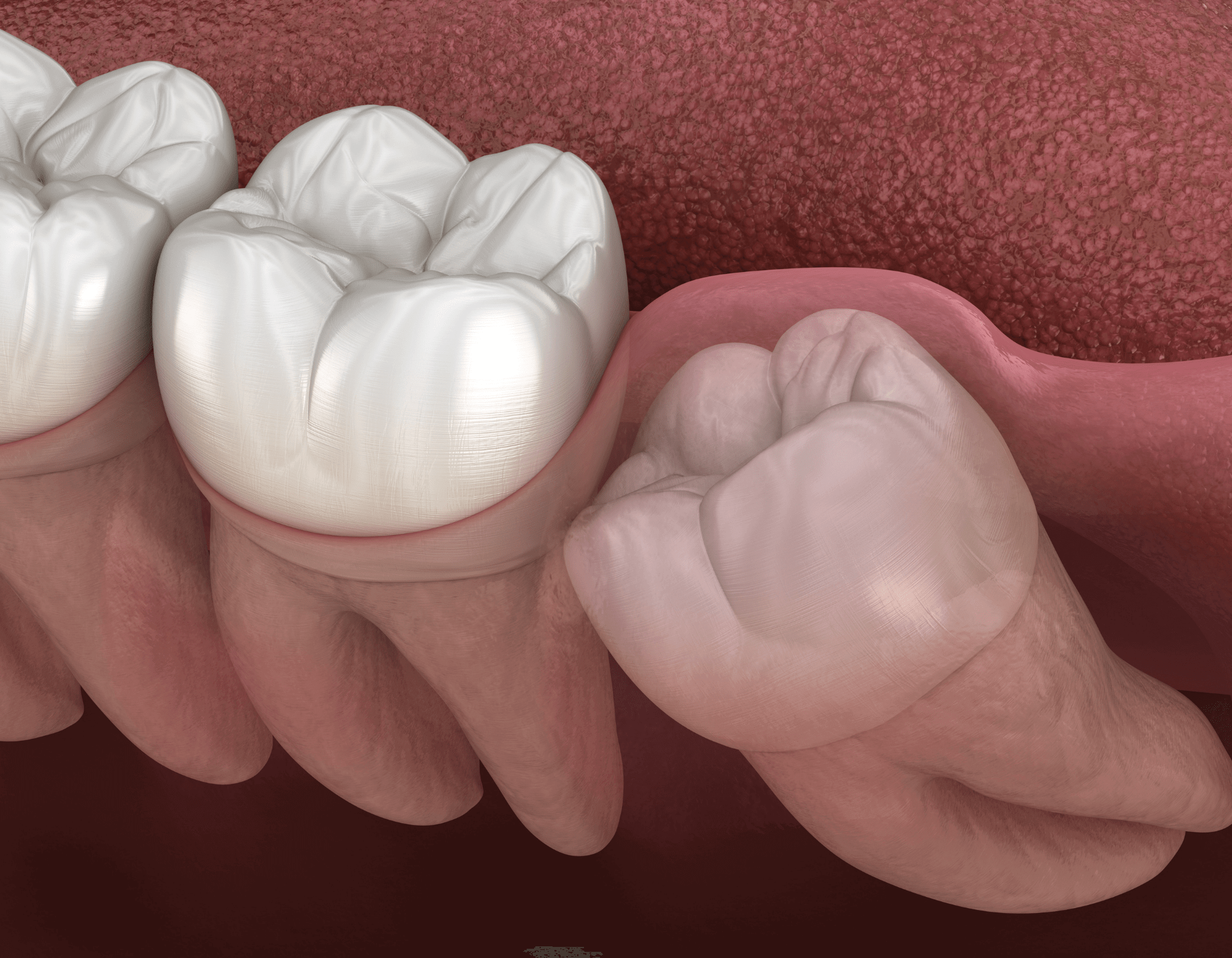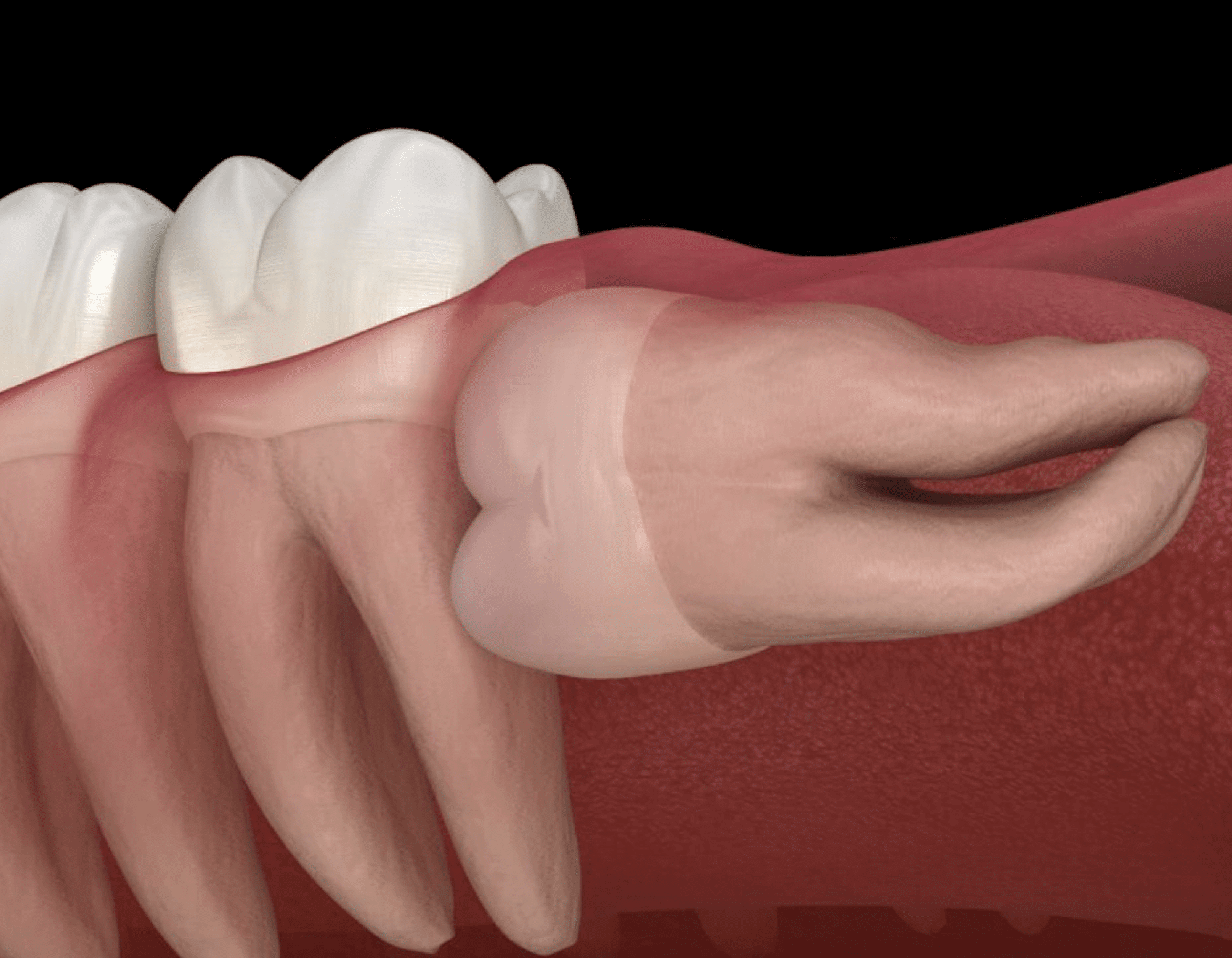
Wisdom Teeth Gold Coast
Part of what we do in maintaining your oral health includes treating wisdom teeth Gold Coast. We provide extreme care to customers to help prevent
The third set of molars, Wisdom Teeth, often emerge in the late teens or early 20s. When the teeth emerge properly and are aligned with other teeth, and the surrounding gum tissue is healthy, wisdom teeth can be left in place without causing problems.
Unfortunately, for other patients, wisdom teeth emerging can be a painful process that can cause serious serious complications. Wisdom teeth can erupt in a number of ways including growing in sideways, only partially protruding from the gum, and in some cases, remaining below the gum and bone, causing pain and pressure in the mouth.
If you believe you need your wisdom teeth removed contact us to schedule a visit to learn if wisdom teeth removal is necessary for you.
To book an appointment, call (07) 5588 3677 during business hours or click here to BOOK ONLINE and someone from our Gold Coast practice will be in touch with you as soon as possible
We Take Care of Your Dental Emergencies Quickly & Professionally. Call Us Today to Book Your Emergency Dental Treatment.
or call us on (07) 5588-3677
A wisdom tooth, also known as a third molar, is the last tooth to erupt in your mouth. A wisdom tooth growing in its space generally occurs between the ages of 15 and 25. Most individuals are born with 4 wisdom teeth.
Wisdom teeth often become impacted due to limited space, which means they become enclosed within the soft tissue and/or the jawbone or only partially break through or erupt through the gum. Partial eruption of the wisdom teeth allows an opening for bacteria to enter around the tooth and cause an infection.
Partially erupted teeth are also more prone to tooth decay and gum disease because their difficult-to-reach location and awkward positioning make brushing and flossing difficult.
Wisdom teeth symptoms include pain, swelling, infection, and deep periodontal pockets. Wisdom teeth pain can be severe and may be an indication of a dental emergency requiring immediate dental removal of wisdom teeth. Because the area in question may be infected, wisdom teeth pain relief will occur upon dental removal of the wisdom tooth or teeth causing the pain.


If there is sufficient room in your mouth, your wisdom teeth will come through without problems. If you do not have enough room in your mouth for your third molars to fully erupt, a number of problems can happen.
Problematic Wisdom Teeth can assume numerous positions in attempts to finally emerge from within the gums, resulting in pain and discomfort. As teeth move, pressure is created causing the other teeth in the mouth to cram closer together, and out of their natural alignment and positioning. In addition to the severe discomfort felt during this process, once the teeth do emerge, the gum around the erupted teeth creates an opportunity to let bacteria in, leaving patients at risk of an infection that is characterised by swelling, soreness and pain.
Removing problematic wisdom teeth is the recommended solution to resolving these issues. The preventative measure can help relieve pain and discomfort, and is an important step in maintaining excellent oral health and limiting the chance for future illness.
One common reason for having wisdom teeth extracted is because they are often impacted. Impaction refers to teeth that are stuck over the jawbone, but under the gum line. Wisdom teeth can be either partially or fully impacted. Partial impaction refers to teeth that have partially erupted from the gum line, but still have other parts below the gum line. Full impaction refers to teeth that have never broken through the gum line.
Besides being partially or fully impacted, there are three different types of wisdom teeth impaction that can occur, including:

Vertical impaction describes a tooth that is vertical or almost vertical in position. Since this is the proper position for eruption, this type of impaction may not require extraction. However in cases where the tooth is pressing into the tooth next to it, or if there is excess pressure being exerted on the tooth’s roots, extraction may be needed.

Angular impaction describes a tooth that is angled from 1-90 degrees. Teeth while a small angle may be closely monitored, while teeth that are closer to 90 degrees will likely be extracted to prevent damage to the surrounding teeth, bone, and gums.

Horizontal impaction describes a tooth that is completely horizontal, or parallel, to the gum line. Most cases of horizontal impaction are fully impacted. Out of all the types of impaction, this is the most painful because the horizontal wisdom tooth is constantly applying force to the molar next to it. For this reason, horizontal impacted wisdom teeth will need to be extracted as soon as possible.
Prior to undergoing oral surgery, you will meet with our surgeon during a consultation. The goal of this visit is to assess your current oral health, determine what steps need to be taken, take x-rays and answer your questions.
On the day of your wisdom teeth removal, your oral surgeon will administer sedation therapy and painkilling medication to ensure you are completely relaxed and experience no discomfort. Depending on the state of your wisdom teeth (partially erupted, unerupted or impacted), your oral surgeon will perform either a simple or surgical extraction. The procedure will take about 30 to 60 minutes.
Although wisdom tooth extraction is generally regarded as a safe procedure, the success of your surgery depends, in large part, on the experience and qualifications of your oral surgeon. The outcome is affected by the quality of the dentist’s training as well as his or her use of proper surgical techniques.
In order to ensure a smooth recovery, at ArtSmiles our oral surgeons utilise only the most cutting-edge technologies available and minimally invasive surgical techniques to minimise side effects and discomfort and improve oral health and appearance. State of the art sterilisation and infection control techniques are used at all times. We strive to ensure each patient is comfortable with the process and confident with their results.
The fee for your treatment is determined by a number of factors. These may include the difficulty involved in removing your teeth and which type of anesthesia is best for you. During your consultation appointment, the surgeon will need to review your x-rays, complete an examination and determine the best option for anesthesia, before an accurate estimate can be provided. Every insurance company has a different policy regarding the extent of coverage for a given surgical procedure. The oral surgeon’s office staff will help you obtain maximum insurance coverage for your treatment.
or call us on (07) 5588 3677
The ArtSmiles Club is a great solution for those who do not have Private Dental Insurance. It allows uninsured individuals and families to gain access to routine preventive care and emergency exams at no extra cost and additional services at a reduced cost (Up to 30% off).
Certainly. The majority of people should look into wisdom teeth removal. There’s a slight chance that wisdom teeth will grow into proper position where they can be easily cleaned. However, over 85% of people will have impacted wisdom teeth, meaning there isn’t enough room for the wisdom tooth to grow into the proper position. Impacted wisdom teeth cause irritation or infection of the gums, or crowding and decay of other teeth, ultimately leading to wisdom teeth pain.
The cause of wisdom teeth pain can be due to:
Some patients will experience discomfort from pressure, infection, inflammation or irritated and deep periodontal pockets when their wisdom teeth emerge. The only way to know for sure if your wisdom teeth need to be removed is to have an Oral Surgeon evaluate them by taking a Panoramic X-ray. Despite the considerable concern regarding impacted wisdom teeth, several recent studies found that third molars which have broken through the tissue and erupted into the mouth, in a normal, upright position, may be just as prone to disease as those third molars that remain impacted. Not all problems related to wisdom teeth are painful or visible. Damage can occur without you being aware of it. No one can predict when wisdom teeth complications will occur, but when they do, wisdom teeth pain can be more severe and difficult to treat, thus complicating teeth surgery.
Initially, the dentist will take an orthopantogram (OPG) to assess the position of the tooth and it’s relationship to other teeth, nerve, blood vessels or sinus. Sometimes with difficult root structures or close to nerves the dentist may need to take a special 3D x-ray called a Cone Beam x-ray.
It is common for wisdom teeth extraction to be performed in the late teens to early twenties (between ages 16 and 20). The best time to have wisdom teeth removed is when the roots are ½ to ⅔ developed, and the only way to know this is with an x-ray examination.
In general, early removal can make the entire process easier for the following reasons:
Wisdom teeth can cause problems at any age after the teenage years. However, the risk of complications or a dental emergency with teeth extraction goes up the older you get.
Even if your teeth have fully grown in, removal is almost always possible when you go to a skilled oral and maxillofacial surgeon. Our oral surgeons have years of experience removing wisdom teeth efficiently and safely.
Wisdom tooth removal is now more comfortable than ever. Using local anaesthetics, our oral surgeons can make your dental extraction experience more pleasant than ever. After the gums are numbed, your dentist opens the gums up so they can be gently pushed aside. The wisdom tooth is then exposed and extracted. Most often the tooth is dislodged in one whole piece. Occasionally the tooth is removed in two pieces to limit risk to the underlying nerve, or because smaller pieces are easier to remove, making for a smoother dental removal. After the wisdom tooth removal, the gums are closed with sutures to help accelerate the healing process.
The teeth surgery procedure itself is mostly painless. With sedation dentistry you’ll be relaxed and comfortable. In addition to sedation, local anaesthetics numb the mouth to anything that could be painful. Most people experience some soreness during the healing period following surgery. At ArtSmiles Dental Clinic, our dentists utilise recent advances in medicine and state-of-the-art technology to allow patients to have wisdom teeth pain, to undergo their dental removal in a manner that promotes rapid healing and minimal post-operative discomfort.
Soreness and swelling from a dental removal may last several days. Ice packs and prescription pain medication help limit any pain during the healing period. The sockets normally will close and fully heal in three to four weeks. As with any teeth surgery, you are likely to experience pain, swelling, and some bleeding. The recovery period after oral surgery can take several days, and in some cases there may still be swelling and discomfort for a week or more. We recommend using ice packs, while enjoying soft foods, and keeping your mouth clean by rinsing with simple salt water. Non-woven sponges and moistened black tea bags can aid in the slowing of any bleeding. If you notice any unusual symptoms like discharge, severe pain or a fever, call us here at ArtSmiles right away. While complications post dental extraction, such as an infection, are rare, they are possible.
The dentist will explain exactly what steps you should take following the surgery, but generally here’s what to expect:
While your mouth recovers from a tooth extraction, it is imperative not to disrupt the blood clot or irritate your healing gums. You should not consume solid foods, alcohol, coffee, soda or hot beverages in the first few days following your teeth extraction. The length of recovery depends a lot on how bad the wisdom teeth impaction was and how they were erupting. There are plenty of things you can do to make teeth removal recovery time easier. Definitely plan on taking it easy for a few days; you can resume your normal activities after the first day in most cases, but for about a week you don’t want to do anything that could dislodge the blood clot from where the wisdom teeth extraction took place. For the pain, our dentists can prescribe pain medicine and pain relievers. To help with the swelling, place an ice pack over the swollen teeth surgery area. The cold helps to reduce the inflammation and ease any dental removal pain. Avoid brushing, spitting, flossing and rinsing for 24 hours. After that, you can gently brush your teeth. Rinse your mouth with salt water frequently to help keep it clean and prevent an infection. You want to eat a soft-food diet for the first day or more and then slowly move to semi-soft foods when you are ready. The teeth extraction recovery period can take several days and in some cases there may still be swelling and discomfort for a week or more.
Although rare, most patients describe the pain from dry socket symptoms as a dull, throbbing pain to a sharp stabbing pain that is aggravated by eating and is tender to the touch. The pain usually starts about three to four days after the wisdom teeth removal, and rarely goes away by itself. After extraction, a blood clot forms in the tooth socket, the space that once held the tooth, and seals the area so that it can heal. A dry socket occurs when the blood clot is dislodged, exposing the bone and nerves. The first five or so days after wisdom teeth removal are the most critical, and it is during this time that the risk for a dry socket is the highest. The most common cause of a dry socket is smoking or having a history of smoking within 72 hours of surgery. A dry socket can be very painful. If you think you have this condition, contact us immediately.

Part of what we do in maintaining your oral health includes treating wisdom teeth Gold Coast. We provide extreme care to customers to help prevent
We Take Care of Your Dental Emergencies Quickly & Professionally. Call Us Today to Book Your Emergency Dental Treatment.
or call us on (07) 5588-3677